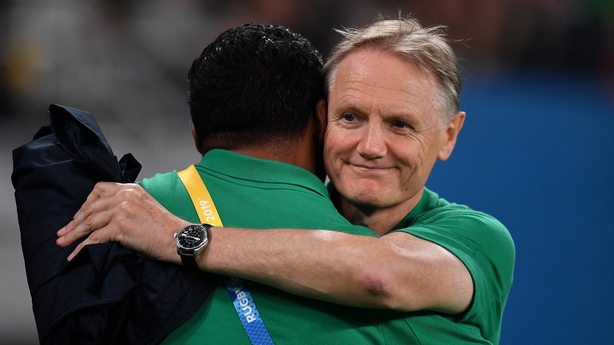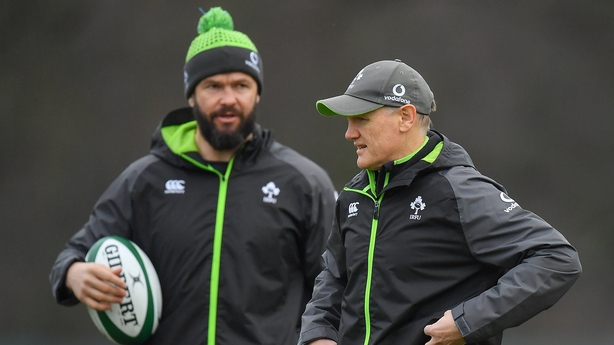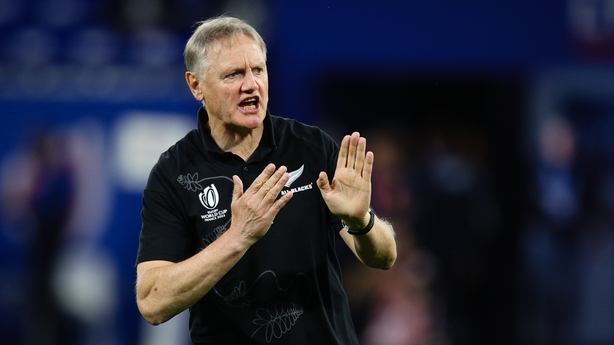Ian Foster has been relegated to the status of a mere frontman. As far as the Irish media is concerned, whether true or not, Joe Schmidt will be treated as the de facto New Zealand coach this week.
For a coach who was hailed as an all-knowing rugby genius during his time here, Schmidt's Ireland reign has aged poorly in the public mind.
The notion would have seemed inconceivable at the end of 2018.
Ireland were Grand Slam champions and had just beaten the All Blacks for the second time in the Schmidt era, having beaten them exactly zero times in the previous century.
They'd won a series away to Australia, at a time when that was still considered something to boast about. The previous year, they'd swatted away South Africa like they were a Tier 2 outfit.
He was plainly the greatest coach in Ireland's rugby history. To argue otherwise was contrarian silliness.
There was occasional cribbing about Ireland's repetitive, attritional approach in attack, although during the good times this primarily came from neutrals. Joe had crunched the numbers and decreed that offloads weren't worth the trouble, except in very particular circumstances or as part of some orchestrated manouvere.
The flashes of thrilling and extravagant rugby usually came, on closer inspection, from pre-ordained set-piece plays. Prime examples included Jacob Stockdale's winning try against New Zealand and the second try in the Grand Slam game in Twickenham, created by a Tadhg Furlong no-look pirouette pass.
By contrast, the 41 phases that preceded 'Le Drop' in Paris 2018 was Schmidt's Ireland at its most characteristic and effective.
Ireland were perfectly primed heading into the World Cup year. Having won back-to-back Six Nations titles in his first two years, Schmidt's original tilt at a World Cup in 2015 had run aground after a ruinous injury crisis, which was regarded as significant mitigation.
Three years on, however, they had hardened into a relentless winning machine. And then it all imploded.
Irish rugby fans watched the year of 2019 unfold in a state of ever-increasing panic, waiting for the all-conquering outfit of the previous season to re-appear onstage. Despite alarming results and performances, such was the residual belief in Schmidt's powers that many still kept the faith right until the end.

But it was clear by the World Cup quarter-final humbling against New Zealand that the crop of 2018 were long gone, replaced by shrivelled husks. Their previously minimal error count was now multiplying out of control. They played the All Black game like a team on the brink of nervous exhaustion.
Indeed, that was the official conclusion of the confidential report into what went wrong. Much of Ireland's woes in the 2019 World Cup were attributed to "performance anxiety."
The following autumn, Gary Keegan, the architect of Irish boxing's revival in the 2000s, who subsequently worked with Jim Gavin's Dublin team, was drafted in to focus specifically on this area.
In a rather frosty zoom briefing with the rugby media the following winter, David Nucifora was asked what measures had been taken to combat said performance anxiety, simply replying "it has been addressed".
As usual, after a World Cup debacle, the scales fell from people's eyes. Previously cherished assumptions were now up for interrogation, Schmidt's genius being among them.
His celebrated attention to detail was re-cast as mentally draining control freakery. His notorious 'Monday morning review' sessions, instead of serving to iron out kinks in performance, were now seen as fostering a culture of fear among the playing staff.
Familiar anecdotes - about hotel key cards and the like - were swiftly re-framed in a negative light. Schmidt's reputation as a terrifying schoolmaster inside the squad did jar slightly with novice parish priest persona when addressing the media.
The 2019 World Cup review was kept under tight wraps, with Nucifora flatly saying "it had been distributed to the people who needed to read it." Nonetheless, some comments from players have slipped out from time to time.
"Sometimes, before Faz, I was so anxious coming into camp, I'd be counting every bump on the driveway into Carton House because I was going to a place that could be very stressful," Andrew Porter told the Sunday Times back in March.
"It's not hugely different, but it is different to under Joe when we were based at Carton House 24/7, you felt you were at work all the time" - Mick Kearney
Asked about Schmidt on Monday, team manager Mick Kearney diplomatically elucidated on the differences between the current regime and the last.
"One of the key differences is that it's probably a more relaxed environment under Andy than it was under Joe. That's not to say that the environment under Joe was in any way poor.
"Andy has introduced a lot of softer skills in terms of getting the families involved, a lot of down-time for players and staff – they're not always on...
"They're well able to enjoy the fun, their down-time. It's not hugely different, but it is different to under Joe when we were based at Carton House 24/7, you felt you were at work all the time."
For the Six Nations of 2020 - which ended up finishing seven months later than advertised for reasons one might recall - Irish rugby resolved to do everything differently. The 'comfortable in chaos' mantra promoted by Leo Cullen and Stuart Lancaster at Leinster was now held aloft as the ideal.
2020 was a drab and mediocre year on the field for Ireland - and worse again off the field thanks to Covid.
Andy Farrell was regarded as an inexperienced monarch and his team were still groping around for an identity. He presided over a humdrum Six Nations, where Ireland won their home games against Scotland, Italy and a fast-declining Wales but were roundly smashed in both Paris and London.
In the same testy media briefing where Nucifora gave little away, Farrell told sceptical reporters that Ireland's game was evolving and whether they noticed that was hardly his fault.

Mike Catt was brought in as attack coach, to rather limited fanfare at the time. They were accused of swinging the pendulum too far from the Schmidt template.
"Detail has become a dirty word in Irish rugby," Bernard Jackman wryly observed that November.
However, after an underwhelming first 18 months in charge, things came together around the back end of 2021 and Irish rugby has taken flight again. Ireland's winning run has surpassed their efforts under Schmidt in 2017-18 and been achieved with a more dynamic and creative game plan.
It was around then that Schmidt's long-touted arrival into the New Zealand set-up was announced, though tellingly this was held off until August 2022 after the Irish tour.
While Scott Robertson is due to take over from 2024, the All Blacks are generally thought to have improved in the meantime, collecting another Rugby Championship this summer. Though, it's worth noting that even in the supposed annus horribilis of 2022, they still won the Rugby Championship somehow.
New Zealand's players attest to his 'awesomeness' in interviews, and his imprint was all over their opening try of the tournament, when Mark Talea went over against the French after a typical piece of pre-planned set-piece wizardry.

One central question is, to what extent have Ireland ditched the Schmidt template and to what extent does he deserve credit for Ireland's current situation?
Schmidt's reputation may have been diminished by both the denouement of his reign and the achievements of his successor but his legacy serves Ireland still.
In the speed and precision of Ireland's ruck play, the clarity around their roles, the impact of the Schmidt era is seen. Much of what bred into Irish rugby has stood the test of time.
At the beginning of 2021, Farrell invited one of Schmidt's most ardent admirers, Paul O'Connell, in as forwards coach.
"Paul was probably one of Joe's biggest fans," observes Kearney.
"I think he’s put into practice a lot of the habits that Joe instilled into the team and even uses some of the language that Joe used.
"So I think that there has been a lot of what Joe did in his period of time that we still use.
"But obviously with Andy as head coach and Mike Catt as attack/backs coach there has been a fair bit of tweaking as well. We play a very different game to what we played under Joe, much more ball-in-hand and 15-man focused."








